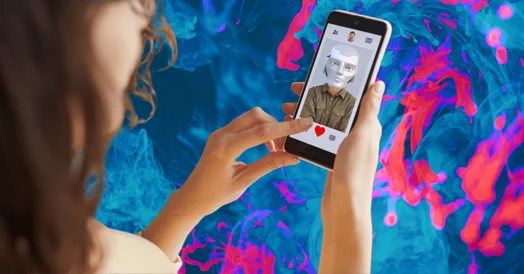How AI-Generated Scams Are Blurring the Lines in Online Dating: What Every Swipe Through Artificial Intelligence Could Cost You
Online dating has long been marketed as a way to help people find love, but in today’s digital age, it’s no longer just about romance—it’s about recognizing reality from illusion. As artificial intelligence (AI) continues to evolve, the landscape of relationships is being reshaped in exciting and alarming ways.
From AI-generated profiles and deepfakes to romance scams and chatbots, the ability to detect genuine connection is under threat. In this article, we’ll uncover how AI is blurring the lines between real and fake on dating platforms, why it matters, and how to stay safe in this new age of AI dating.
1. The Rise of AI-Powered Dating Profiles
The modern dating app relies heavily on AI tools to personalize matches, suggest bios, and even suggest optimal times to swipe. While this seems convenient, it has a darker side: the same technology is being used to create fake profiles at scale.
Cybercriminals are now using AI-powered applications to generate photorealistic faces, write compelling bios, and simulate human-like behavior. These AI-generated profiles can interact in fluent conversation, mimic humor, and adapt to emotional cues—all while deceiving the user into believing they’ve found a romantic partner.
This is particularly concerning because it opens the door for fraud, identity theft, and privacy violations. With over 300 million users on dating platforms worldwide, the pool of potential victims has never been larger.
The challenge? Even real people now find it difficult to distinguish human profiles from AI-generated ones.
2. From Romance to Risk: Scammers Use Chatbots to Mimic Emotions
Scammers use increasingly sophisticated AI chatbot systems trained on massive datasets to simulate real-time interaction. These bots, often built on platforms like ChatGPT, are capable of holding detailed, emotional conversations, sending heartfelt messages, and even feigning vulnerability to build trust.
These aren’t the crude bots of the early internet. Today’s AI-powered chatbots are designed to manipulate human emotion. Many victims report that conversations felt deeply romantic, complete with compliments, future planning, and even shared Spotify playlists.
After emotional investment is made, the scam escalates. The chatbot might claim a sudden crisis—medical, financial, or legal—and ask for help. Victims, believing they’ve formed a real connection, often send money or sensitive information.
The FBI reports a surge in romance scams across the US, with total financial loss in the billions. These scams are especially effective because they exploit two things people want most: love and trust.
3. Deepfake Technology Is Fueling Digital Deception
Few AI tools are as dangerous in the online dating space as deepfakes. This technology uses machine learning to alter audio and video recordings, allowing someone’s voice or face to be swapped with another’s. The result? Highly convincing, often undetectable impersonations.
Scammers use deepfakes to impersonate attractive people, sometimes even celebrities, to lure victims into conversations or private video calls. In some cases, these interactions are recorded and used for blackmail, especially among adult users who may share explicit material.
The trend is global. In India, for example, there’s been a rapid rise in deepfake-based dating fraud. Victims are often targeted on social media platforms like Instagram and TikTok, where scammers can harvest images to create AI-generated images for deceptive accounts.
Because deepfakes can bypass traditional detection methods like reverse image searches, users must become more vigilant and cautious about whom they engage with.
4. Fraudulent Dating Apps and the Explosion of Privacy Risks
The explosion of new dating apps has made it easier for people to meet new connections. But it has also created a prime environment for fraudulent dating apps to thrive.
These malicious apps are often designed to look like legitimate applications, but once installed, they can track your location, steal login credentials, and even spy on your phone’s camera or microphone. Worse, they often use AI to simulate real interactions, making them seem authentic at first glance.
These fake apps might also encourage users to share sensitive photos or personal data, which are later used for identity theft or extortion. In many cases, victims are drawn into fake “verification” processes or prompted to make in-app payments for fake services.
To avoid these traps:
- Only download apps from trusted sources (Google Play, Apple Store)
- Research the app’s history and user reviews
- Use privacy-focused settings when sharing data
The digital deception these apps enable is one of the most crucial threats in AI dating today.
5. The Emotional Toll: From Catfishing to Identity Theft
The emotional cost of catfishing goes far beyond embarrassment. Victims of AI-generated scams often experience psychological trauma, depression, anxiety, and a deep sense of betrayal.
One of the key reasons for this pain is the growing difficulty in identifying real people online. The line between authenticity and illusion is vanishing as AI continues to reshape what it means to form a genuine connection.
Some scammers even use stolen voice recordings to create voice memos, songs, or videos that seem deeply personal. Victims believe they’ve met their soulmate—only to discover it was an illusion designed to steal their trust, money, or identity.
In a 2024 survey, 61% of online daters reported suspecting they had interacted with an AI bot, and 1 in 4 admitted they had flirted with a bot—either knowingly or unknowingly.
The fallout from these interactions is real: lost money, broken hearts, and lasting emotional damage.
6. How AI Is Reshaping Dating Conversations
One of the more subtle ways AI is impacting online dating is through the actual conversation. Many dating platforms now use AI tools to:
- Auto-generate opening lines
- Suggest conversation topics
- Translate messages in real time
While this can help break the ice, it also means the messages you’re receiving may not be written by a human. Some apps even offer “autopilot mode,” where the app uses AI to handle an entire date for you—from the first swipe to scheduling a meetup.
The result is a trend toward increasingly shallow or artificial interaction. AI isn’t just blurring the lines between people—it’s automating the entire experience.
This trend raises serious cybersecurity and ethical concerns, especially as AI’s influence grows in spaces where emotions and expectations are involved.
7. Protecting Yourself in the Digital Age of AI Dating
If you want to date safely in a world where AI is blurring the lines between fiction and reality, you’ll need to stay sharp and proactive.
H3: 6 Practical Tips to Stay Safe
- Use reverse image searches to verify profile pictures
- Video call before meeting anyone or forming a deep emotional bond
- Never send money or sensitive documents to someone you’ve never met
- Avoid downloading unknown apps or clicking links in chats
- Look out for scripted or generic messages, especially if they seem too perfect
- Choose platforms that use AI scam detection, like identity verification and bot removal
Most importantly, remember that genuine romantic relationships are based on honesty and trust—not polished photos or fast-moving flattery.
Final Thoughts: Finding Real Love in a World of Digital Deception
AI is changing every aspect of our lives—and online dating is no exception. From AI-powered profiles to deep fakes, catfishing, and chatbots, the reality is that technology is no longer just helping us connect. It’s challenging our very definition of connection.
But not all is lost. If we approach AI dating with awareness, caution, and the right tools, we can still find meaningful relationships in a world full of illusions.
Dating in the digital age doesn’t have to mean sacrificing authenticity. It just means we need to be smarter, more informed, and always a little more vigilant.



